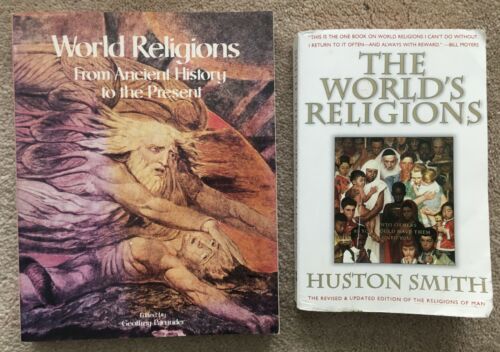- Teacher: Helen Wilcox-Evwaraye
Course Description
This course is designed based on the textbooks – The World’s Religions by Huston Smith, and Unity and World Religions by Paul John Roach, with the objectives of 1) identifying the principles and data concerning the major world religions; 2) Describing the evolution of the concept of God; 3) identifying the links between world religions and Unity/New Thought. The course explores some of the different ways in which, historically, mankind has tried to answer through religion, questions such as: What is sacred? What does my life depend on? Is it worth living or dying? Why do people suffer? Answers will show how different religious traditions have identified the basic problems of humanity and the meanings of existence. The religious traditions included in this course are Christianity, Islam, Buddhism, Hinduism and Judaism. In addition, the candidate will choose two (2) additional religions for a total of seven (7) to be studied.- Teacher: Helen Wilcox-Evwaraye
The International Ministerial Program courses are intended to provide ministerial candidates
with basic information with experiential practice in the various areas of ministerial awareness
that comprise this Program. Candidates will then continue to develop and strengthen skills by
further researching the topics and applying the knowledge acquired in their respective roles and
tasks as Unity leaders. Candidates are expected to incorporate this knowledge and skills into the
daily practice of Unity fundamentals in their daily lives.
The literature on emotional intelligence shows a strong link between emotional intelligence and
success in leadership. This class seeks to lay the foundation for strengthening emotional
intelligence and explore the development of spiritual intelligence and its role in leadership in
ministry. Candidates are expected to study, research and develop their emotional and spiritual
intelligence and apply their knowledge in their personal and ministerial life.
At the end of the course, candidates will demonstrate their understanding and applicability of the
concepts of emotional and spiritual intelligence in their personal, social, and ministerial lives
through written work assigned by the tutor, analysis of digital resources, and an oral presentation
of the topics studied.
During the course, the candidates will write essays of 200 to 300 words and perform activities
following the instructions presented for each Written Work. In these assignments they will
demonstrate their understanding of the content presented and how it has been applied or can be
adapted to develop strengths and overcome challenges related to emotional and spiritual
intelligence.
Referece-Texts:
Emotional Intelligence (1995) Author Goleman, Daniel
The Twelve Powers Charles Fillmore. Unity classic library
- Teacher: Carmen-Venus Baerga
- Teacher: Claudia Maltos-Young

The course is designed to offer candidates a practical and simple guide about oratory and practice of rhetorical to address a Unity audience. Oratory Techniques introduces you to the basic concepts and techniques of public speaking, bearing in mind that your ability to develop effective public speaking skills will equip you with the ability to speak in a variety of social and academic situations, including techniques to lessen speaker anxiety and to enhance your understanding of spoken discourse. A pre-requisite to this course is Communication Skills 1 & 2, and also Conversation Skills.
- Teacher: Ada Igwe

Course Description:
The course explores some of the different ways in which historically, humanity has attempted to answer, through religion, questions such as: What is sacred?, What am I? What is life all about? Why do people suffer? Answers to these questions will show how different religious traditions have sought to understand the meaning of existence and humanity’s role in it. The religious traditions included in this course are Hinduism, Buddhism, Confucianism, Taoism, Islam, Christianity, and native traditional African, Australian, Oceania, and the Americas.
Learning Outcomes:
At the end this course students will be able to
• Identify and explain the universal principles in each of the world’s
predominant religions that transcend time and culture.
• Describe the evolution of the concept of God in the various religious traditions.
• Appreciate why and how religions guide and motivate the lives of their adherents – those who live by them.
• Critically analyze their understanding of these major religions and determine what common threads there are between them and Unity/New Thought.
• Share their individual spiritual journey, how it has unfolded, and the part religion has played in this unfoldment.
Learning Mode:
This is an Independent Study Course. Students will use the resources provided and other online resources to research into the world’s major religions with the objective of:
1) Identifying the principles that define each of them.
2) Describing the evolution of the concept of God
3) Identifying the links between world religions and Unity/New Thought Students work independently to achieve these objectives and the learning outcomes within the designated period for this course (June 10 – August 05). Moodle learning platform will be used to support students’ learning.
You will receive details of login information including Username and Password in a separate e-mail from our IMP Moodle Platform Manager by July 6, 2023.
Resources
• Interview Videos (50-minutes) based on Huston Smith’s The World Religions will be available on the course Moodle Platform.
• You will receive electronic version of Unity and World Religion by Paul John Roach
• You will also receive a downloaded copy of Study Guide for Unity and World Religions.
- Teacher: Helen Wilcox-Evwaraye